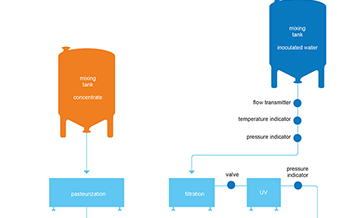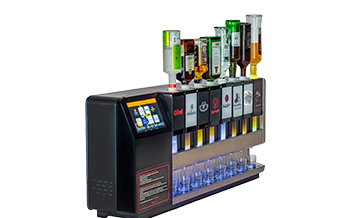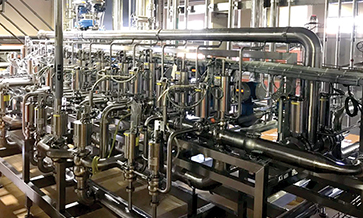Digitalisation in the production environment has made a name for itself under the term ‘Industry 4.0’. It refers to the “intelligent networking of machines and sequences used in an industrial setting with the aid of information and communications technology”.
Taking the step into a digital environment makes a lot of sense for companies on many levels. It can be used to design production sequences more efficiently and to optimally plan and make use of existing resources, including systems, processes, materials and employees.
Collecting and analysing data from ongoing production allows sequences to be designed more flexibly and with the greatest possible degree of automation. They are then also less susceptible to malfunctions or stops.
In short, digital production helps uncover a wealth of optimisation potential –and this is precisely why it is one of the greatest forces adding impetus to and influencing the production of the future.
‘Industry 4.0’
However, you do not need to look too far ahead to find such potential. As in many other industries, the food and beverage industry is already home to a large number of digital solutions along the value chain today. The only prerequisite is a willingness to embrace and accomplish such a digital transformation.
The central technology and basis for the employment of ‘Industry 4.0’ is the Internet of Things (IoT). It describes the network of physical objects – “things” that are embedded with sensors, devices, software, and other technologies for the purpose of connecting and exchanging data with other devices and systems over the internet.
Intelligently utilising such data for subjects such as predictive maintenance is the task of data science. This interdisciplinary field of science uses methods, processes, algorithms and systems to extract knowledge and insights from large and complex data records.
Data science often necessitates knowledge and algorithms from machine learning, software engineering, as well as domain knowledge, such as machine knowledge. At Krones too data scientists work, for instance, on the development of models aimed at uncovering mechanical faults in machines or so-called “time stealers” in its lines.
Pre-requisites
The greatest possible benefits are gained from digital solutions if they are provided with artificial intelligence (AI). It describes the area of computer science that deals with machine learning and the automation of human behaviour.
This involves developing applications with which machines can use humanoid intelligence, meaning they are capable of learning, solving problems and recognising patterns.
In an industrial environment, one speaks of the IIoT (Industrial Internet of Things) as an enabler for the use of digital solutions. As in IoT, this is also where relevant data is collected, exchanged and evaluated –the difference being that here it is at machine or line level.
Processes can be subsequently optimised, cost savings achieved or productivity increased as the condition of the machine can be better assessed. This method makes it possible, for example, to make prognoses regarding potential downtimes or to even completely prevent downtimes from occurring.
But to make working with data possible at all, one thing is quite crucial: the connectivity of the machines and lines. Connectivity means that a computer, program, device or system is generally capable of connecting to the internet, another computer, etc.
This connectivity forms the basis for the exchange of data – and thus the basis for all digital solutions.
However, connectivity on its own is not enough – for only when the individual machines and lines are permanently connected is it possible for companies to benefit from the acquired data. It is, therefore, imperative to establish a digital ecosystem right from the outset.
This refers to connected IT resources that can function as a unit. Digital ecosystems are made up of suppliers, customers, trade partners, applications, third-party suppliers of data services and all of the technologies related to them. Collaboration and interoperability are key to the ecosystem’s success.
Cloud solutions
All companies who wish to benefit fully from the advantages offered by digital production are wise to use cloud solutions. “Using the cloud” means that the data is not saved and processed locally on servers onsite, but rather in an outsourced computer centre.
The advantages of software operated at cloud-based level are diverse, as it is continually updated and thus always available in its latest version. In addition, all you need is internet access to have your data available on every end device.
The system is also worthwhile for the user from a cost viewpoint, as you save on the need to make investments in a separate server landscape.
Before it is possible to utilise cloud solutions in your everyday production activities, an IIoT platform is required, as this is the central gathering point for services, also referred to as applications.
This is the tool required to use cloud-based services, similar to an operating system used for running specific apps. Specific basic conditions must be created, for example, the stability and security of the platform and its services, or a corresponding management for users, rights and roles.
Integrating production
Since the future of digital production in the food and beverage industry lies here, new machines and lines are nowadays normally equipped so that cloud solutions can be used with ease. This is achieved through the employment of a so-called edge device.
Such a device is integrated directly into the control cabinets of the system, downloads data from the controllers and transmits it into the cloud. Connecting the edge device to the cloud enables locally generated data available independent of the location. Its use depends on the provision of a permanent internet connection.
However, it is possible to equip existing systems with the necessary basics for connectivity. The subsequent integration of an edge device is required here.
Not every food or beverage company wishes to dive full throttle into the world of digitalisation, or let someone else take over the management of its production and line data!
The application of on-premise solutions makes sense here. Such solutions are managed locally on a separate server. If the plant owner uses on-premise software, they purchase the licensing rights to use the software on their device in the long term.
It is then installed and operated in the owner’s own network. Such an option offers a high level of control, but also has the disadvantage that the software is not automatically updated when a newer version is available.
Krones Ecosystem
The foundation for the networking of a Krones line is provided by Connected Line. This concept supplies the basis for the collection of machine and production data, as well as making its cloud-based services available for further processing.
Every new Krones line delivered since 2020 includes a Connected Line, as it is already equipped with the edge device ReadyKit and an Ethernet network. Lines delivered before 2020 can also be included in the Krones Ecosystem. The subsequent integration of an edge device (ReadyKit) is required.
If the food or beverage producer now also uses the Krones IIoT platform and at least one of the corresponding cloud services, the company will benefit from the concept of a Connected Line.
In the Krones Ecosystem, Krones then groups together its digital solutions on one central platform. Based on this, a network is created between the delivered production lines and Krones through the continual exchange of data –and the added benefits of digital solutions can be comprehensively used for the plant owner and for Krones.
The Krones Ecosystem, therefore, offers food and beverage producers the correct solutions to optimise their production and lower line production costs. It goes without saying that the Krones Ecosystem will be expanded to include more applications. In this way, Krones expands its production-data-based collaboration with plant owners through to ‘Managed by Krones’.
If producers already have lines in their own, or in another ecosystem, they can also be connected to the Krones Ecosystem – interfaces to other networks are taken into consideration by Krones and made possible through targeted action.
The use of Krones’ own IIoT platform is required before digital services from Krones can be used. It contains a digital twin of the installed machines and lines, as well as a sophisticated user management system.
This is a browser-based online portal through which the plant owner can use to access available digital services from a central position. An account can be queried via the Krones website.
Krones digital services ultimately help food and beverage producers to have reliable production, maintain an overview of all sequences, optimise their value creation process and, in the end, to optimise their total cost of ownership.
Who benefits?
Every day, millions of glass bottles, cans and PET containers run through a Krones line. As a supplier for complete systems, Krones provides breweries, beverage bottlers and food producers all over the world with individual machines and with complete production lines.
A step towards digitalisation is particularly worthwhile for all of those food and beverage corporations that have a high level of production and time pressures; have high-quality demands on their product and production sequences; have limited resources when it comes to their production lines; wish to avoid rejects and product losses; produce a wide variety of batches; and wish to reduce their CO2 footprint and produce sustainably.
The use of digital solutions allows all of the processes and sequences to be optimised to ultimately generate a more flexible and efficient production process. A holistic, well-conceived digitalisation concept can, therefore, ultimately create a competitive advantage.
– The Krones Group, headquartered in Neutraubling, Germany, designs and implements complete lines for beverages and food, which cover each production process step – from product and container production, filling and packaging, all the way up to material flow and container recycling. You can find all digital solutions from the technology and machinery provider on https://www.krones.com/en/














